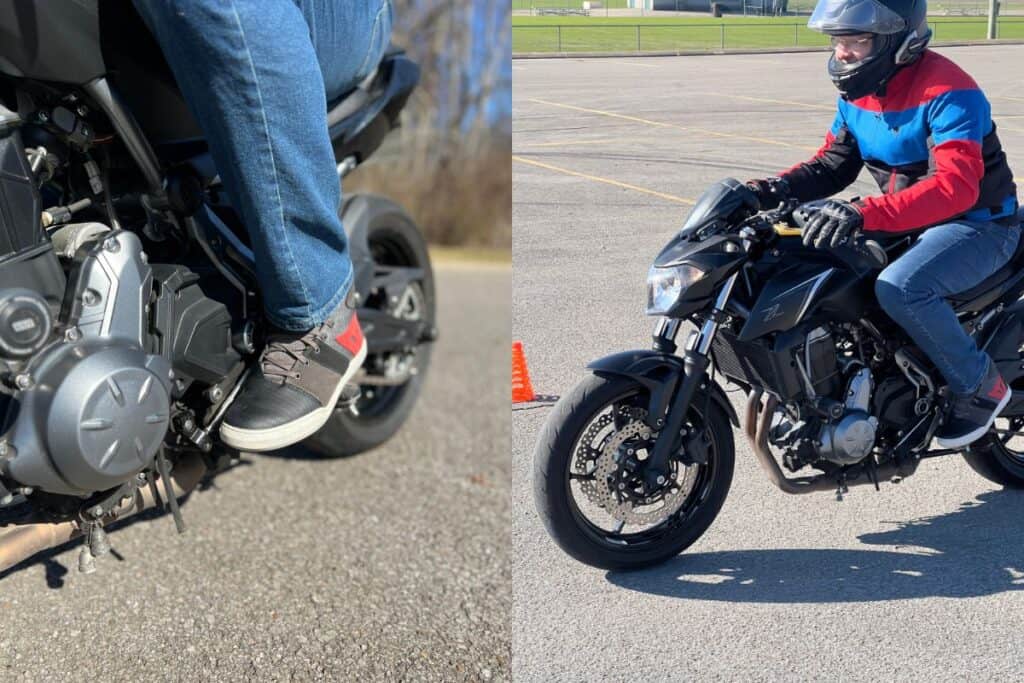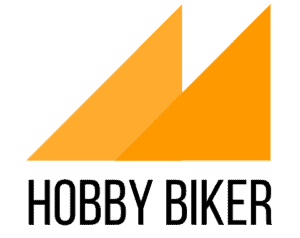Passing the MSF course can be an exciting step in getting your motorcycle license, but there are still was few things you need to do before you’re ready to get out on the road and ride.
In this article, we go over what you need to do after passing the MSF course and some tips to help you become a safe and efficient rider.
After you pass the MSF course, you need to go to the DMV to get your license, shop for a motorcycle, buy better gear and then continue to learn and invest in educating yourself on the motorcycle. The MSF course is the first step in becoming a safe rider and continuing to improve yourself is how you become that much safer on the motorcycle.
As I mentioned before, passing the MSF course is the first step in getting your motorcycle license but it’s not the only necessary step. Here are a few things you should do after you pass the MSF course as well as some tips to help you on your way.
Get Your License From the DMV
After you pass the MSF course, they will provide you with a card or voucher that will allow you to go to the DMV and pick up your Motorcycle license. This voucher will show that you completed the necessary coursework to earn a motorcycle license and you don’t have to take the riding or written test at the DMV.
When you get the MSF certificate, go ahead and schedule an appointment with your local DMV. They will either issue you a motorcycle license or add the motorcycle endorsement to your existing license.
Shop for a Motorcycle
Some people already have a motorcycle by this point but if you decided to wait until you got your license, then good job. The MSF course is a great introduction to motorcycles and can even affect which motorcycle style you want.

After you pass the MSF course and get your license, it’s time to start shopping for a motorcycle.
As a beginner, you also want to make sure you pick something appropriate for a beginner. Here are a few tips to help you pick the right motorcycle:
1. Set a Budget
First things first, you need to establish your budget. Once you start shopping for a motorcycle, its easy to get lost among all the cool and expensive bikes. By establishing your budget first, you will have a guideline that will keep you level-headed and will prevent you from getting in over your head with an expensive motorcycle or motorcycle payment.
2. Choose Your Style
Next, you need to pick the right style of motorcycle for you. There are many different styles of motorcycles, from cruisers and dual sports to sportbikes and naked bikes. Depending on the MSF course you took, you may have already had experience with a cruiser-style motorcycle or a dual-sport. Regardless, do some research on the different styles of motorcycles to see which one fits you best. Once you narrow it down to a couple of styles you like, take a trip to your local motorcycle dealer to see if you can try them out to see what feels most comfortable for you.
3. Look for the Right Fit and Weight
Adding to the previous step, the fit and weight of your motorcycle will play a huge role in your comfort and confidence on the bike. This is especially important for beginner riders, as you are still learning to operate a motorcycle. Getting a motorcycle that doesn’t fit you well or that is too heavy, can make you scared to ride and will prevent you from getting better faster. As well, it can cause you discomfort when you ride, making the whole experience more stressful.
4. Choose the Right CC and Horsepower
Finally, make sure you pick a good CC and Horsepower for your size and comfort level. A lot of new riders make the mistake of getting too much power, which can be disastrous for new riders still learning the ins and outs of motorcycles. Most beginner riders will be suited for 250cc to 650cc motorcycles depending on their size and skill levels. If you are a larger rider, you may need a motorcycle with more power than a 250cc. For smaller riders, 250cc will suit all the needs you have for years to come. Regardless, make sure you stick to the smaller more beginner-cc motorcycles. They are less expensive and more manageable for new riders.
Once you find a motorcycle that fits your comfort and skill level, it is time to reinvest in your best asset – You! The Rider
Buy Better Motorcycle Gear

One of the best investments you can make is investing in better motorcycle gear. If you wore the bare minimum to the MSF course, it’s time to get fully geared up before you hit the street. If you don’t already have them, now is the time to get a better jacket, riding boots, gloves, riding pants, and maybe even a better helmet. Your gear is the only thing protecting you on the motorcycle, make sure you treat this as a worthwhile investment.
For a detailed breakdown of motorcycle gear, check out this article on Essential motorcycle gear.
Practice on Your Street and in Local Areas
Now that you have your motorcycle and the right gear, it’s time to finally get on the street. But don’t go riding too far too soon. As a new rider, you will be nervous and unsure. This is why I recommend you ride in your neighborhood or immediate local area first. If your only experience on a motorcycle is with the MSF course, you will need a little more practice on the motorcycle before you start riding for real on the street. Riding in your neighborhood will slowly introduce you to the skills you need to ride on the road and will also help you build more comfort on the bike. And since you are most familiar with your neighborhood, you won’t be as nervous about taking the bike out by yourself.
Practice Braking and Low-Speed Drills in a Parking Lot
After you build comfort on the motorcycle by riding in your neighborhood, it’s time to start riding on the street and in traffic. If you’re still nervous about riding in traffic, try to ride at a time of day when there is less traffic on the road and only stick to the roads you know like the back of your hand. Once you are comfortable riding on the street, it’s time to ride over to your local park or some other place with a large parking lot for you to practice. If you want to quickly build confidence on your motorcycle, do some low-speed maneuvers and braking drills at a nearby parking lot. This is one of the best ways to build comfort on your bike but is often one of the most overlooked sets of skills. I guarantee, even if you only do 30 minutes of braking drills or low-speed maneuvers, you will feel like you are riding a completely different bike home. You will feel more in control of the bike and a lot less nervous. And don’t just practice once and call it a day, try to at least practice your emergency braking once a week. This will keep your skills fresh and will make you a substantially better rider overall.
Find Good Riding Friends

Now comes the fun part. Once you get comfortable on the bike and you are confident to ride in your local area, it is time to start making some friends. In fact, the riding buddies I found early on have become lifelong friends and have helped me become a better rider. Riding partners will help you learn new skills, introduce you to new roads, and will give you the sense of camaraderie that comes with riding a motorcycle. And don’t worry about finding friends to ride with, they are surprisingly easy to come by, especially if you visit a bike night. Here are a few ways you can find riding buddies:
Join a Local Motorcycle Facebook Group
You can find a lot of riders just by joining your local motorcycle facebook group. And chances are, you have more than one group you can join. I subscribe to a few Facebook groups and there is no shortage of riders looking for new riding buddies.
Attend a Local Bike Night or Event
Another great way to find friends is to attend a local Bike Night or event. Motorcycle stores and dealerships are always putting on events or bike nights where riders meet and mingle. If anything, go to look at the different bikes. There’s a chance the rider will appreciate your interest and you can easily start a conversation that leads to friendship.
Engage With Other Riders You See Out Riding
An underrated way to make riding friends is to engage with other riders you see out on the road. I can’t tell you how many times I’ve been out solo riding just to run into a fellow rider who is up for some company. This is great for beginner riders as you can often find new roads and routes just by following someone else riding in your area. Just don’t become a nuisance, if they don’t seem like they want company, it’s probably best to leave them that way.
Finding riding partners is one of the most rewarding experiences you can have on a motorcycle. You can easily make lifelong friends with similar interests on and off the motorcycle.
Take More Courses and Invest in More Riding Education

Once you start to feel more comfortable and confident on the motorcycle, it is time to start re-investing in educating yourself as a rider. This can be anything from learning how to do basic motorcycle maintenance to taking a full-fledged motorcycle course. There are plenty of motorcycle courses to choose from, you can even return to the MSF for the Advanced Rider Course. Whatever you do, remember that learning to ride a motorcycle is a lifelong endeavor, and you should always be looking to improve your skills and education on the bike.
How Long is the MSF Course Certificate Good For?
Finally, don’t feel too rushed to get all this done. Although I recommend getting your license immediately after you pass the MSF course, you still have some time to get everything sorted before your certificate expires.
On average, the MSF certificate will be good for a year after passing the MSF Course. This allows you enough time to get your license and save for a motorcycle without losing some of the skills you learned during the course. Once a year passes, you will need to retake the course to refresh your skills.
As a final word, I want to say congratulations on Passing the MSF Course! You have learned a great new skill and have joined an awesome community of riders. Ride safe and have fun!

